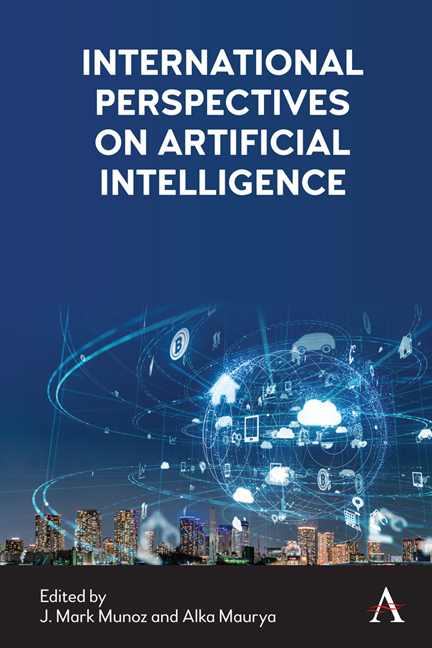Book contents
- Frontmatter
- Contents
- List of Illustrations
- List of Contributors
- Chapter 1 Introduction
- Chapter 2 Artificial Intelligence in the United States
- Chapter 3 Artificial Intelligence in Canada
- Chapter 4 The Mad Max Interceptor Experience in the UK: Artificial Intelligence in Mortgages
- Chapter 5 Artificial Intelligence in Germany: Strategy and Policy—the Impact of AI on German Economy
- Chapter 6 Japan's ‘Artificial-Intelligence Hospital’ Project: Can It Help the Ageing Population?
- Chapter 7 Artificial Intelligence in the Middle East European Countries
- Chapter 8 A Million Products for a Billion People: Artificial Intelligence in Consumer Industries in India
- Chapter 9 “All-In AI”: What is Compelling Companies in China to Bet the House on Artificial Intelligence?
- Chapter 10 Artificial Intelligence Research in Russia: Recovering from the Polar Winter
- Chapter 11 The Fourth Industrial Revolution in Africa
- Chapter 12 The Adoption of Artificial Intelligence within the Caribbean: Resuscitating the CARICOM's Single Market and Economy
- Chapter 13 Has Australia Been Late in Addressing the Artificial Intelligence Challenges?
- Chapter 14 Conclusion
- Index
Chapter 13 - Has Australia Been Late in Addressing the Artificial Intelligence Challenges?
Published online by Cambridge University Press: 02 March 2022
- Frontmatter
- Contents
- List of Illustrations
- List of Contributors
- Chapter 1 Introduction
- Chapter 2 Artificial Intelligence in the United States
- Chapter 3 Artificial Intelligence in Canada
- Chapter 4 The Mad Max Interceptor Experience in the UK: Artificial Intelligence in Mortgages
- Chapter 5 Artificial Intelligence in Germany: Strategy and Policy—the Impact of AI on German Economy
- Chapter 6 Japan's ‘Artificial-Intelligence Hospital’ Project: Can It Help the Ageing Population?
- Chapter 7 Artificial Intelligence in the Middle East European Countries
- Chapter 8 A Million Products for a Billion People: Artificial Intelligence in Consumer Industries in India
- Chapter 9 “All-In AI”: What is Compelling Companies in China to Bet the House on Artificial Intelligence?
- Chapter 10 Artificial Intelligence Research in Russia: Recovering from the Polar Winter
- Chapter 11 The Fourth Industrial Revolution in Africa
- Chapter 12 The Adoption of Artificial Intelligence within the Caribbean: Resuscitating the CARICOM's Single Market and Economy
- Chapter 13 Has Australia Been Late in Addressing the Artificial Intelligence Challenges?
- Chapter 14 Conclusion
- Index
Summary
Introduction
This study focusses on artificial intelligence (AI) and its impact on Australian industry. AI is threatening organizations by disruption at a globally level. The value of AI to the global economy is expected to increase by US$16 trillion by 2030 (GEF 2017). Organizational leaders are focusing on answering questions such as ‘where should we target investment, and what kind of capabilities would enable us to perform better?’ (PwC 2017, 4). A report from PricewaterhouseCoopers (PwC 2017) has projected that China will have a 26 per cent gain of GDP in 2030, followed by North America with 14.5 per cent. The report projects a total of 70 per cent (or US$10.7 trillion) of AI's global economic impact. The same report suggests that Europe and developed countries in Asia will benefit significantly with a growth of 9–12 per cent in GDP in 2030. Developing countries in Africa, Latin America and Asia may have a modest gain of about 6 per cent. But what about Australia? Has Australia been late in turning to address the AI challenges?
Like most countries, Australia is experiencing a great change in the way work is performed (ACS 2020; Deloitte 2019; Syam and Sharma 2018). Australia has been a laggard in addressing challenges of AI and creating appropriate policies to deal with AI-disruption (Elliott 2019a, 2019b). This is changing as the Australian government has provided a budget of $29.9 million to enhance AI and machine learning (Future of Life 2020). AI policy initiatives for Australia include: AU$1.4 million for PhD scholarships to support emerging Australian researchers in artificial intelligence and machine learning; an AI Technology Roadmap project recognizing barriers and opportunities to build Australian capability; development and assistance for future government policy; and the development of an Australia AI ethics framework (OECD 2020; DISER 2020).
The Australian tech future or digital economy strategy focuses on integrating businesses, government and community aims to maximize potential benefits and opportunities that are possible by advanced digital technology. In addition, the CSIRO Innovation Fund is a AU$242 million venture capital fund investing in new spin-off companies, existing start-ups and SMEs to foster technological development. The Next Generation Technologies Fund with a AU$730 million budget aims to promote innovation and is managed by the Defence Science and Technology which is part of Australia's Department of Defence.
- Type
- Chapter
- Information
- International Perspectives on Artificial Intelligence , pp. 117 - 126Publisher: Anthem PressPrint publication year: 2022

